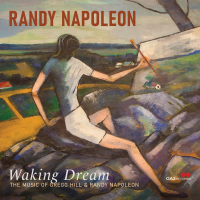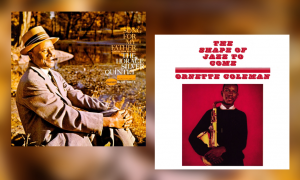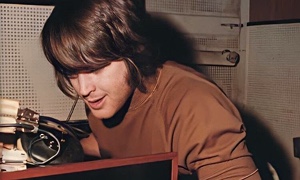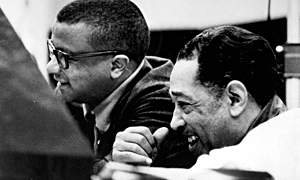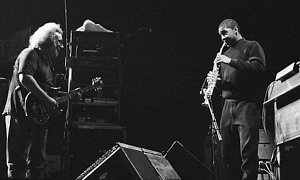Home » Jazz Articles » Building a Jazz Library » George Coleman: An Alternative Top Ten Albums
George Coleman: An Alternative Top Ten Albums

There are certain people that are well publicized. Me, I've always been in the background. I've never been bitter about it. I've played with some of the great players in the business. Didn't sound too bad. Made a few records of my own. I feel like I can be happy.
—George Coleman
George Coleman
saxophone, tenorb.1935

Max Roach
drums1925 - 2007

Lee Morgan
trumpet1938 - 1972
Glittering careers have been built on flimsier foundations. Yet Coleman's reputation among musicians, which is mountain high among almost all of them (about which more below), has not transferred into a commensurate profile with the wider jazz audience. Coleman's following, passionate though it is, has always been niche.
One of Coleman's nicknames is Big George, another is The Memphis Monster. Both suggest the character of Coleman's high-voltage playing, but neither hints at the lyricism he brings to ballads, nor his harmonic sophistication, nor the outside eruptions which punctuate his essentially inside improvisations.
In a complicated world, simplicity pays dividends and it is possible that Coleman's style is too multifaceted for its own marketable good. This goes some way towards explaining why he has not received the recognition he deserves. In addition, Coleman has never made a calculatedly "commercial" record in his life, under his own name or anyone else's. He has followed his muse, not mammon.
Another explanation for Coleman's marginalisation is that, following City Lights, he was in no apparent hurry to start a solo career. It seems he chose not to pitch to Blue Note after making that album or after being featured on others by pianist

Herbie Hancock
pianob.1940

Elvin Jones
drums1927 - 2004

Jimmy Smith
organ, Hammond B31925 - 2005

John Coltrane
saxophone1926 - 1967

Barry Harris
piano1929 - 2021
But the indications are that Coleman has never made a serious attempt to get into bed with a label with enough clout to bring him to a wider audience, and neither has he had an ambitious manager doing the hustling for him. Nor has he prioritized short-term financial interests. For instance, he quit the

Miles Davis
trumpet1926 - 1991

Tony Williams
drums1945 - 1997
Cruelty to children is a terrible thing, but many people would have forgiven Coleman had he given Williams a clip round the ear. (Just like they might have done had

Elvin Jones
drums1927 - 2004

Rashied Ali
drums1935 - 2009

Lester Young
saxophone1909 - 1959
In an interview with Downbeat in 1980, Coleman explained his decision to leave Davis differently. "Miles was ill during that time and a lot of times he wouldn't make the gigs and it was frustrating," said Coleman. "His hip was bothering him. So there was a lot of pressure on me. And sometimes the money would be late and I'd get a cheque and have to try and get it cashed, so I really got tired of it, so I just decided to leave."
The bottom line, fortunately, is that Coleman appears fulfilled by the way his career has turned out. In an All About Jazz interview with R.J. DeLuke in 2002, he said: "There are certain people that are well publicized. Me, I've always been in the background. I've never been bitter about it. I've had people say, as a matter of fact it sounds like a broken record, 'Man, you should be this...Why don't they give you what you deserve,' and all that. I feel I've done enough. I look at myself and I say I've accomplished enough. I've played with some of the great players in the business. Didn't sound too bad. Made a few records of my own. With all these things, I feel like I can retire and be happy." In 2015, America's National Endowment for the Arts honoured Coleman with a Jazz Master Award.
GEORGE COLEMAN: TEN TOP SIDEMAN ALBUMS
Instead of focusing on the albums Coleman has recorded leading his own bands, all of which are highly recommended, this Top Ten chooses from those Coleman has made as a featured sideman. Many of these accord him a prominence akin to that of the leader. But as with any musician who has enjoyed a career as long and distinguished as Coleman's, selecting just ten so-called top albums is a tough task however you cut the cake. The choice of albums below is wholly subjective; there are plenty of other worthy contenders.The smallest lineup here is a trio, the largest a sextet, and most are quartets or quintets. Albums made with bigger ensembles, which offered more limited solo opportunities, such as the excellent ones Coleman made with bassist

Charles Mingus
bass, acoustic1922 - 1979

Charles Tolliver
trumpetb.1942
Hopefully you will find one or two items that have so far escaped your attention or which may have faded from memory.
 Lee Morgan
Lee MorganCity Lights
Blue Note, 1957
Lee Morgan's City Lights is Coleman's jazz recording debut. His style is still developing, so the album is a significant historical marker. Little acorns and so on. But not so little in this case. On the opening title track, Coleman delivers a tenor solo that is a harbinger of the full-throttle head charge which marks his mature up-tempo work. On the closing "Kin Folks," a mid-tempo blues, he delivers a soulful alto solo. Between times there is another tough tenor solo on "Just By Myself" and a lyrical alto one on "Tempo De Waltz." (All four tunes, incidentally, were written by tenor player

Benny Golson
saxophone, tenor1929 - 2024

Curtis Fuller
trombone1934 - 2021
Alfred Lion
producer1908 - 1987

Rudy Van Gelder
various1924 - 2016
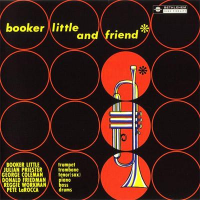 Booker Little
Booker LittleBooker Little & Friend
Bethlehem, 1961
Trumpeter

Booker Little
trumpet1938 - 1961

Max Roach
drums1925 - 2007

Julian Priester
tromboneb.1935

Don Friedman
piano1935 - 2016

Reggie Workman
bassb.1937
 Miles Davis
Miles Davis In Europe: Recorded Live At The Antibes Jazz Festival
Columbia, 1964
A credible argument can be made that Miles Davis' so-called second great quintet was not, as conventional wisdom holds, the 1964-68 one with tenor saxophonist

Wayne Shorter
saxophone1933 - 2023

Ron Carter
bassb.1937
 Miles Davis
Miles Davis My Funny Valentine: In Concert
Columbia, 1965
Eight months later and Davis' band is inching further along the route towards abstraction. But the destination is still some distance off and My Funny Valentine: In Concert is in the same blissful ballpark as the Antibes performance. The album was recorded at the Philharmonic Hall, Lincoln Center in February 1964. So was Four And More: Recorded Live In Concert (Columbia, 1966); Columbia decided to separate out the slower and faster tunes, putting the slower ones on My Funny Valentine. Exquisitely lyrical, this is one of the great live albums of its era, ranking alongside other landmarks such as pianist

Bill Evans
piano1929 - 1980
 Herbie Hancock
Herbie Hancock Maiden Voyage
Blue Note, 1965
Coleman quit the Davis quintet shortly after the 1964 Lincoln Center concert, and, as noted earlier, it is likely that one reason for his decision was that he was made to feel unwelcome by Tony Williams. In Miles: The Autobiography (Simon & Schuster, 1989), Davis said: "Tony Williams never liked the way George played, and the direction the band was moving in revolved around Tony. George was a hell of a musician... but Tony wanted someone... like

Ornette Coleman
saxophone, alto1930 - 2015

Freddie Hubbard
trumpet1938 - 2008
 Mal Waldron
Mal Waldron Sweet Love, Bitter
Impulse, 1967
In 1963, pianist

Mal Waldron
piano1925 - 2002

Charlie Parker
saxophone, alto1920 - 1955

Charles Davis
saxophoneb.1933
Dave Burns
trumpetb.1924

Richard Davis
bass, acoustic1930 - 2023

George Duvivier
bassb.1920
Al Dreares
b.1929 Elvin Jones
Elvin JonesLive At The Village Vanguard
Enja, 1968 / 1974
If we need affirmation of Coleman's talent (and we do not), his presence in drummer Elvin Jones' pianoless trio in 1968, the year following the passing of Jones' longtime employer, saxophonist

John Coltrane
saxophone1926 - 1967
Wilbur Little
bass, acousticb.1928
 Roy Brooks
Roy BrooksThe Free Slave
Muse, 1972
Drummer
Roy Brooks
drumsb.1938

Horace Silver
piano1928 - 2014

Yusef Lateef
woodwinds1920 - 2013

Woody Shaw
trumpet1944 - 1989

Hugh Lawson
piano1935 - 1997

Cecil McBee
bassb.1935
 Cedar Walton
Cedar WaltonEastern Rebellion
Timeless, 1976
A magnificent album from a quartet led by pianist

Cedar Walton
piano1934 - 2013

Sam Jones
bass, acoustic1924 - 1981

Billy Higgins
drums1936 - 2001
 Ahmad Jamal
Ahmad Jamal? L'Olympia
Dreyfus Jazz, 2001
This album, recorded in concert in Paris in late 2000 to celebrate pianist

Ahmad Jamal
piano1930 - 2023

James Cammack
bass
Idris Muhammad
drums1939 - 2014
Tags
Comments
PREVIOUS / NEXT
George Coleman Concerts

George Coleman
New Orleans Jazz MarketNew Orleans, LA

George Coleman
New Orleans Jazz MarketNew Orleans, LA

George Coleman
RegattabarCambridge, MA

George Coleman
RegattabarCambridge, MA

George Coleman
RegattabarCambridge, MA

George Coleman
RegattabarCambridge, MA
Support All About Jazz
 All About Jazz has been a pillar of jazz since 1995, championing it as an art form and, more importantly, supporting the musicians who make it. Our enduring commitment has made "AAJ" one of the most culturally important websites of its kind, read by hundreds of thousands of fans, musicians and industry figures every month.
All About Jazz has been a pillar of jazz since 1995, championing it as an art form and, more importantly, supporting the musicians who make it. Our enduring commitment has made "AAJ" one of the most culturally important websites of its kind, read by hundreds of thousands of fans, musicians and industry figures every month.





 Buy Now
Buy Now



